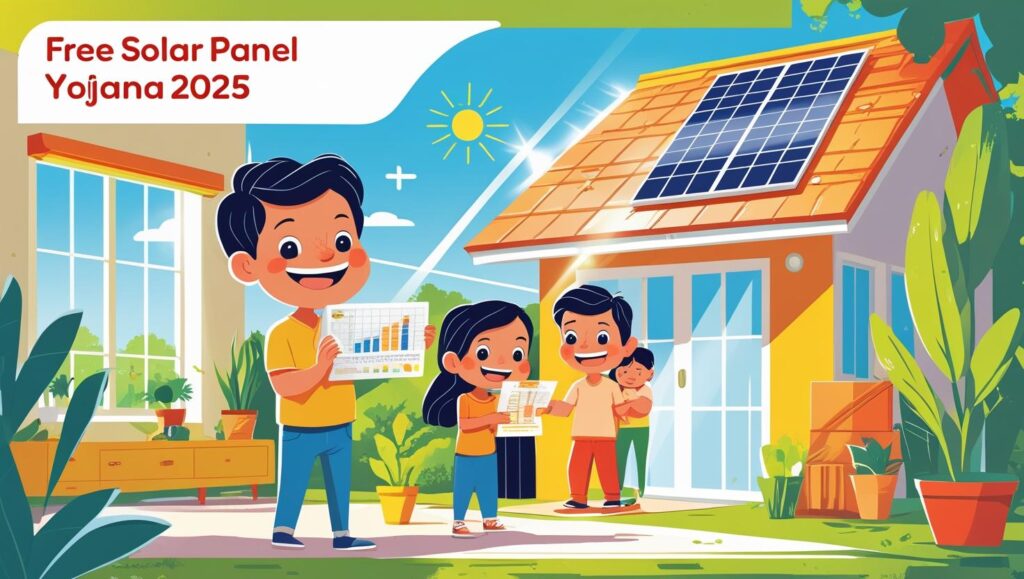
Ultimate Guide to Solar Rooftop Scheme 2025 – Benefits, Subsidy, How to Apply
Learn everything about India’s PM Surya Ghar Muft Bijli Yojana 2025. Get ₹78,000 subsidy, up to 300 units free electricity, and low-interest solar loans. Apply now!
🔍 Introduction: Why Solar Rooftop Is a Game-Changer in 2025
Are your electricity bills skyrocketing every month? Do you wish there was a sustainable solution that could reduce your expenses and support the environment?
Well, India’s Solar Rooftop Scheme 2025, also known as the PM Surya Ghar Muft Bijli Yojana, is your answer!
This government initiative empowers homeowners with free electricity up to 300 units/month, massive subsidies, and low-interest loans—making solar energy more accessible than ever.
In this guide, you’ll learn everything you need to know: benefits, eligibility, application process, real-life examples, FAQs, and more.
☀️ What Is the PM Surya Ghar Solar Rooftop Scheme?
The Solar Rooftop Scheme is a flagship program by the Government of India launched under PM Surya Ghar: Muft Bijli Yojana in February 2024, aiming to:
- Provide up to ₹78,000 subsidy for solar rooftop installations
- Offer 300 free electricity units/month to eligible households
- Reach 1 crore+ homes by 2027
- Promote green energy adoption and reduce dependence on fossil fuels
This scheme is backed by ₹75,021 crore in funding and is executed via the pmsuryaghar.gov.in and jansamarth.in portals.
🎯 Key Features of the Solar Rooftop Scheme 2025
| Feature | Details |
|---|---|
| Subsidy Amount | ₹30,000 for 1 kW, ₹60,000 for 2 kW, ₹78,000 for 3+ kW |
| Free Electricity | Up to 300 units/month |
| Loan Facility | Up to ₹6 lakh, interest ~7%, tenure 10 years |
| Platform | National portal: PM Suryaghar Portal |
| Eligibility | Indian citizens with rooftop ownership |
| Application Mode | Fully online via integrated portals |
✅ Benefits of the Solar Rooftop Scheme for Households
1. Substantial Government Subsidy
- Direct bank transfer of subsidy post-installation
- No need to pay full system cost upfront
2. Free Electricity
- Get up to 300 units/month free—savings of ₹1500–₹2000/month
3. Collateral-Free Loans
- No credit history required for loans under ₹2 lakh
- Banks like SBI, Indian Bank, and Central Bank offer dedicated solar loans
4. Increase in Property Value
- A solar-powered home is more valuable in real estate
5. Eco-Friendly
- Reduces your carbon footprint
- Helps India reach its Net Zero Carbon Emission goals by 2070
🔄 Real-Life Example
Ramesh Patel from Gujarat installed a 3kW rooftop system using the PM Surya Ghar scheme. He now saves ₹1800/month on electricity and received ₹78,000 subsidy directly in his bank account. His ₹1.5 lakh investment will be recovered in just 3 years.Solar Rooftop SchemeSolar Rooftop SchemeSolar Rooftop Scheme
🏡 Who Is Eligible for the Solar Rooftop Scheme?
You are eligible if:
- You are an Indian citizen
- You own a house or rooftop space
- You have a valid electricity connection
- You haven’t received a solar subsidy before
- You agree to use MNRE-approved vendors & components
🧾 Required Documents
- Aadhar Card
- PAN Card
- Latest Electricity Bill
- Property Ownership Proof
- Bank Account Details (for subsidy transfer)
- Loan documents (if availing loan)
📝 Step-by-Step Application Process
Step 1: Register on PM Surya Ghar Portal
- Visit pmsuryaghar.gov.in
- Enter DISCOM, mobile number, and electricity account ID
Step 2: Select Vendor
- Choose from MNRE-empanelled vendors
- They help with site survey and quotation
Step 3: Submit Application
- Upload documents, select system size (1–3 kW)
- Get technical feasibility approval from DISCOM
Step 4: Install the System
- Approved vendor completes the installation
Step 5: Claim Subsidy
- Net metering done and subsidy is credited to your account
- If availing loan, apply via jansamarth.in
🏦 Loan Facility via JanSamarth Portal
The scheme is linked with the JanSamarth portal—India’s unified credit platform for government-backed loans.
Key Loan Highlights:
- Loan Amount: Up to ₹6 lakh
- Interest Rate: 6.5%–8.6% (floating)
- Tenure: Up to 10 years
- CIBIL Score: Not needed up to ₹2 lakh
- Processing Fee: NIL
Top Banks Involved:
- State Bank of India
- Indian Bank
- Punjab & Sind Bank
- Central Bank of India
🔌 Net Metering Explained
Net metering allows your solar system to send excess electricity back to the grid. This gets adjusted in your monthly bill.
- Units consumed < Units generated → You pay ₹0
- Units consumed > Units generated → You pay only the difference
📊 What’s New in 2025?
| Feature | 2024 | 2025 (New!) |
|---|---|---|
| Portal | State-wise | Unified National Portal |
| Loan Scheme | Limited | Nationwide access via JanSamarth |
| Net Metering | Complex | Simplified & paperless |
| Vendor Onboarding | Manual | Verified digital listings |
| Installations | 4.2 Lakh | 10.9 Lakh+ |
🖼️ Visual Suggestions
- Infographics: “Step-by-Step Application Process”
- Image: Solar panels on Indian rooftops
- Chart: Subsidy vs Savings comparison
- Video: Government promo on Surya Ghar Scheme
🔗 Internal & External Links
Internal Links:
- [Kisan Credit Card Fisheries Scheme 2025 (Your Other Post)]
- [Energy-saving Home Appliances 2025]
External Trusted Sources:
🙋♀️ FAQ Section
1. How much subsidy will I get under the Solar Rooftop Scheme?
You will receive:
- ₹30,000 for 1kW
- ₹60,000 for 2kW
- ₹78,000 for 3kW and above
This amount is directly credited to your linked bank account after successful installation and verification.
2. Can I get a solar loan without credit history?
Yes. Loans under ₹2 lakh are collateral-free and do not require a credit score. This makes it ideal for rural or new-to-credit applicants.
3. Is net metering compulsory?
Net metering is optional but highly recommended as it maximizes your savings. If your system produces more than you use, the extra electricity goes to the grid, offsetting future bills.
4. How long does it take to receive the subsidy?
The subsidy is processed within 30–45 days after DISCOM verifies installation and meter reading. You can track the status via your dashboard on pmsuryaghar.gov.in.
5. What happens if I move houses after installation?
You cannot claim another subsidy for the new home, as the benefit is given only once per beneficiary. However, you can continue to enjoy solar savings in your old house if it’s rented.

